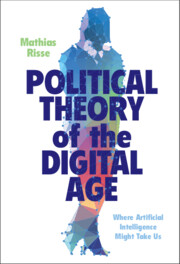Crossref Citations
This Book has been
cited by the following publications. This list is generated based on data provided by Crossref.
Calzada, Igor
2023.
Disruptive Technologies for e-Diasporas: Blockchain, DAOs, Data Cooperatives, Metaverse, and ChatGPT.
SSRN Electronic Journal,
Vavilov, Pavel S.
2023.
Discrediting the subject in the digital age: an experience of conceptualization.
Semiotic studies,
Vol. 3,
Issue. 2,
p.
21.
Jungherr, Andreas
2023.
Artificial Intelligence and Democracy: A Conceptual Framework.
Social Media + Society,
Vol. 9,
Issue. 3,
San Martín Segura, David
2023.
Prevención algorítmica de la violencia de género: la discrecionalidad policial como decisión tecnológica en el contexto de VIOGÉN.
Estudios Penales y Criminológicos,
p.
1.
Shcherbyna, Olena
and
Zayets, Serghiy
2024.
DIFFICULTIES OF INTERPRETING THE CONCEPT OF "HUMAN RIGHTS": A LOGICAL AND PHILOSOPHICAL ASPECT.
Bulletin of Taras Shevchenko National University of Kyiv. Philosophy,
p.
57.
Park, Sungjin
2024.
Theodor W. Adorno, Artificial Intelligence, and Democracy in the Postdigital Era.
Postdigital Science and Education,
Vol. 6,
Issue. 4,
p.
1287.
Blandino, Pierangelo
2024.
Semiotokens, Algorithms, and Blockchain Networks: New Possible Patterns in Legal Thought.
International Journal for the Semiotics of Law - Revue internationale de Sémiotique juridique,
Königs, Peter
2024.
In Defense of ‘Surveillance Capitalism’.
Philosophy & Technology,
Vol. 37,
Issue. 4,
De Ruvo, Giuseppe
2024.
Algorithmic Objectivity as Ideology: Toward a Critical Ethics of Digital Capitalism.
Topoi,
Woods, Dwayne
2024.
Optimizing beyond optimization: Heideggerian limits and artificial intelligence.
AI and Ethics,
Goldmann, Anne
2024.
AI in the German Bundestag: On the relationship between the rhetoric of evidence-based policymaking and artificial intelligence.
p.
288.
Mintemur, Ömer
2024.
Optimization of LightGBM for Song Suggestion Based on Users’ Preferences.
Journal of Intelligent Systems: Theory and Applications,
Vol. 7,
Issue. 2,
p.
56.
Liubchenko, Andrii
Коzakov, Volodymyr
Petkun, Svitlana
Ignatenko, Oleksandr
and
Vinetska, Roza
2024.
The role and place of Ukraine in modern international information policy: modern challenges and strategic imperatives of cooperation.
Salud, Ciencia y Tecnología - Serie de Conferencias,
Vol. 3,
Issue. ,
p.
1131.
Choi-Fitzpatrick, Austin
2024.
Disruption and emergence: How to think about human rights futures.
Journal of Human Rights,
Vol. 23,
Issue. 1,
p.
105.
Huang, Linus Ta-Lun
Papyshev, Gleb
and
Wong, James K.
2024.
Democratizing value alignment: from authoritarian to democratic AI ethics.
AI and Ethics,
Zuk, Peter
2024.
Mental integrity, autonomy, and fundamental interests.
Journal of Medical Ethics,
Vol. 50,
Issue. 10,
p.
676.
Park, Sungjin
2024.
The work of art in the age of generative AI: aura, liberation, and democratization.
AI & SOCIETY,
Singh, Bhupinder
Kaunert, Christian
Ravesangar, Kamalesh
Hammouch, Hind
and
Raghav, Anjali
2025.
Data-Driven Governance Through AI, Digital Marketing, and the Privacy Interplay.
p.
55.



